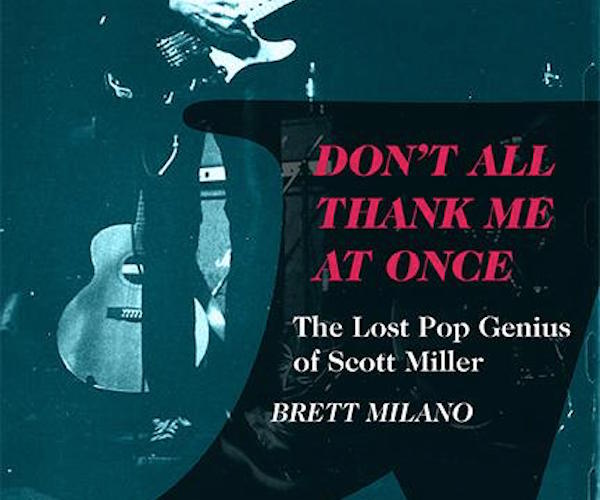Book Review: Homage to Scott Miller — Perceptive Attention Paid to a Lost Pop Genius
Brett Milano approaches his subject with encyclopedic knowledge, a fan’s fervor, and the seasoned music journalist’s skill for turning an artful phrase.
Don’t All Thank Me at Once: The Lost Pop Genius of Scott Miller by Brett Milano. 125 Records, 180 pages, $15.99

By Tim Jackson
In Don’t All Thank Me at Once: The Lost Pop Genius of Scott Miller, Arts Fuse contributor Brett Milano explores a period of pop music of which I was unwittingly ignorant. Set during the rise of ’80’s and ’90s post-punk rock, the book is an appreciation of the prolific and experimental pop songwriter and guitarist Scott Miller. I was in the music business during this period, but no matter — the book sent me scurrying to the Web and iTunes for musical references. Miller, from California, began as an Electrical and Computer Engineer, but switched to music when he was inspired by Mike Nesmith of the Monkees. The latter’s quirky example launched the career of a brainy neophyte musician whose combination of smarts and curiosity created some remarkable rock music. His braininess inevitably led to some stubborn, even obsessive, choices about his creative process; it also generated frustration with marketers and the mainstream record industry. In addition to early groups and side projects, Miller fronted two major bands: Game Theory, a staple of college radio, and the power-pop group The Loud Family. Aware that many are unfamiliar with Scott Miller — Seattle’s grunge scene, led by Nirvana, Pearl Jam, and Alice in Chains, dominated the era — Milano carefully provides the details of Miller’s career. He chooses to eschew the sensational: he turns away from the mystery of Miller’s death/suicide. This volume is a celebration of the musician’s life and art, a valuable appreciation of the man and the music scene that contributed to his distinctive sound.
Milano approaches his subject with encyclopedic knowledge, a fan’s fervor, and the seasoned music journalist’s skill for turning an artful phrase. Miller was a brilliantly eclectic writer who borrowed with ease from multiple literary and musical sources. Unconcerned with commercial glory, he experimented in ways that were personally meaningful to him as an artist. His engineer’s brain was a key ingredient in many of the tracks: “All the digital technology was just hitting the world, and Scott surrounded himself with a bunch of geeks. They were like mad scientists with their loops and sound samples” writes Milano.
Miller’s esoteric knowledge found its way into song lyrics. Discussing “Regenisraen,” a key Game Theory song, Milano comments that “like the Pretender’s “2000 Miles,” it’s a Christmas song where the holiday leads to questions of belief; though the verses express doubts, the celestial chorus is resoundingly spiritual. He continues by quoting Scott on the song: “”Regenistrean” … is not actually a word. It’s Latin for ‘Off the Pigs, acid is groovy’ … The word came to me in a dream, sung roughly as it is on the track. I’m not sure if it’s any real word. I hear the fragments of the words ‘regeneration, ‘rain’ and a few more I can’t remember and it puts me in mind of something like a hymn, glorifying and calling up a source of renewal.”

Musician Scott Miller — this book pays homage to a genius.
The book broadens its perspective by including interviews with Miller’s cohorts and admirers. Aimee Mann is among the supporters/fans of Miller’s songwriting. She is particularly enamored with The Loud Family album Plants and Birds and Rocks and Things: “For me it was such an interesting blend of melodic and classic melodic pop songwriting with massive intelligence. A real facility with words, a very interesting approach lyrically but also very vulnerable and heartfelt, a lot of feelings below the surface.”
Miller’s songs are filled with obscure references from his often-complicated romantic life and relationships with his female band mates. His production ideas were sometimes intended to grate (willfully) against the grain. He published a book, Music: What Happened, a detailed year-by-year compendium — from his blog of the same name — listing (sometimes poetically describing) what he considered to be the key songs from 1959 to 2009.
With the dexterity of a seasoned music writer, Milano’s prose reflects a musician’s understanding of the machinery of a song. Take this description of a ‘quintessential’ Game Theory song, “The Real Sheila”:
A song of adoration to a women identified by name, slightly tragic that the singer is offering her friendship while being denied her love. The song’s three-part structure perfectly suits the sentiments: the verses are minor-key and moody, a moment where the singer’s left alone – then it accelerates with some power chords on – pure hormonal urgency. And finally there is the chorus, where Sheila’s gone again and the singer savors the one triumph he’s got: Nobody knows Sheila like I do. (Note the playing on the word “know” which implies there can be a deeper sense of knowing than the biblical one). Like so many great pop songs, it wrings some glory out of impending heartbreak.
Miller seems to have found solace in the latter part of his life. He had started a family and had a new album in the future. Because of this seeming satisfaction, his suicide is all the more unsettling and tragic. Were the clues there all along? What pushes an artist with such promise to the edge? In his own book, Miller issues this complaint: “There needs to be more music talk in music criticism. Critics hardly ever identify catchy melodies as specific passages within a song.” That is precisely what Milano is best at; there is little doubt Miller would have appreciated this thorough chronicle of his creative process and struggle for authenticity. Don’t All Thank Me at Once: The Lost Pop Genius of Scott Miller is also a bittersweet reminder of how many creative lives and original, talented artists come and go unheralded.
Tim Jackson was an assistant professor of Digital Film and Video for 20 years. His music career in Boston began in the 1970s and includes some 20 groups, recordings, national and international tours, and contributions to film soundtracks. He studied theater and English as an undergraduate, and has also has worked helter skelter as an actor and member of SAG and AFTRA since the 1980s. He has directed three feature documentaries: Chaos and Order: Making American Theater about the American Repertory Theater; Radical Jesters, which profiles the practices of 11 interventionist artists and agit-prop performance groups; When Things Go Wrong: The Robin Lane Story, and the short film The American Gurner. He is a member of the Boston Society of Film Critics. You can read more of his work on his blog.
